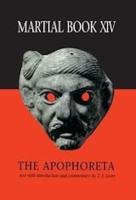
MARTIAL: BOOK XIV Text with introduction and commentary
Ed. by T.J. Leary
Bloomsbury (2016) p/b 306pp £28.99 (ISBN 9781350005402)
MARTIAL: BOOK XIII Text with introduction and commentary
Ed. by T.J. Leary
Bloomsbury (2016) p/b 209pp £32.99 (ISBN 9781350005297)
Originally published in 1996 (XIV, The Apophoreta) and 2001 (XIII, The Xenia) in hardback, these two collections of epigrams are linked in theme and form. Each begins with 2 (XIV) or 3 slightly longer poems, followed by 221 (XIV) and 124 couplets, mostly elegiac, all with a lemma announcing the subject.
Their dominant theme is indicated by the opening poem of XIII (e.g. line 4 postulat ecce novos ebria bruma sales—‘look the drunken winter demands new jests’) and by the first word in XIV sythesibus, Saturnalian dress for senator and eques. Both are concerned with gift-giving at the Saturnalia. Gifts may be for rich or poor (XIV 1.5 divitis alternas et pauperis accipe sortes) and Martial artfully sets rich and poor gifts in alternate couplets (in XIV 69-72 alternate foods are a pastry Priapus, a Rhodian biscuit, a pig and a sausage) but sometimes it is difficult to be sure of a gift’s relative value (XIV 73-76 on birds: a parrot, a crow, a nightingale, a magpie or 77-78 an ivory cage, an ivory medicine chest).
Some longer sequences of epigrams arranged by topic are even more problematical: XIV 183-196 has such pairs as Homeri Batrachomachia (183) and Homerus in pugillaribus membraneis (184), Vergili Culex (185) and Vergilius in membranis (186), Tibullus (193) and Lucanus (194), Catullus (195) and Calvi de aquae figidae usu (196) where the odd numbers are supposedly rich, if the pattern is to be followed. But Martial likes variety even in such a ‘catalogue’ of gifts: some for example are aenigmata in all but name. There are few of the rude jokes which featured at the Saturnalia: one is XIV. 203, a fine example about a girl so sexy she would have made even Hippolytus masturbate (there had to be a ‘nauseous’ epigram).
Through all the multifarious foods, wines and objects (or indeed slaves), L. offers a comprehensive guide whether to the obscure gifts such a Surrentine cups or beccaficos, or seemingly strange ones like turnips or a bundle of cabbage stalks (XIII 16 &17) or the inevitable dormice (XIII.59). The commentaries and the rich introductions (there is some overlap between the two volumes here) are really helpful for all readers who want to approach Martial as literature or for details of the Saturnalia or patronage in general. Although translations precede the notes for each of the poems, commentaries are aimed primarily at advanced students and scholars: quotations from other literature in the notes are not translated and there are references to a wide range of scholarly literature.
At XIII.5 L. translates: ‘You can send these couplets to guests instead of a gift, if sesterces are as scarce with you as they are with me.’ Good thinking, Martial, now that paperbacks make these poems available at a more affordable price at the right season. But get your Christmas order in quickly—these are print on demand.
Alan Beale
